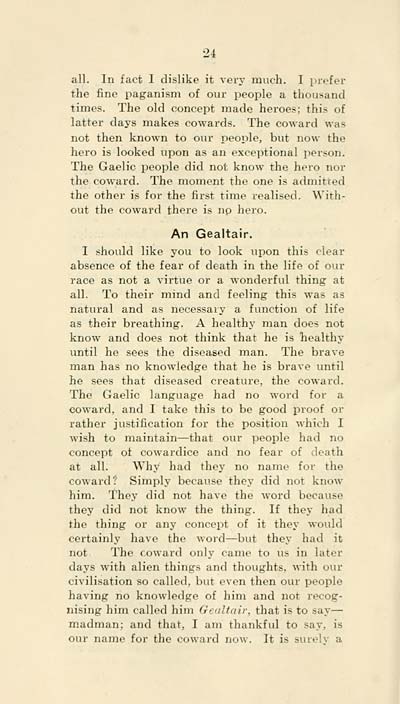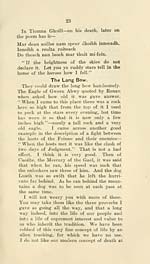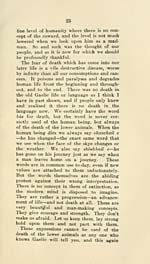Download files
Complete book:
Individual page:
Thumbnail gallery: Grid view | List view

•24:
all. In fact I dislike it very much. I prefer
the fine paganism of our people a thousand
times. The old concept made heroes: this of
latter days makes cowards. The coward was
not then known to our people, but now the
hero is looked upon as an exceptional person.
The Gaelic people did not know the hero nor
the coward. The moment the one is admitted
the other is for the first time realised. With-
out the coward there is np hero.
An Gealtair.
I should like you to look ui^on this clear
absence of the fear of death in the life of our
race as not a virtue or a wonderful thing at
all. To their mind and feeling this was as
natural and as necessary a function of life
as their breathing. A healthy man does not
know and does not think that he is healthy
imtil he sees the diseased man. The brave
man has no knowledge that he is bi-ave until
he sees that diseased creature, the coward.
The Gaelic language had no word for a
coward, and I take this to be good proof or
rather justification for the position which I
wish to maintain — that our people had no
concept of cowardice and no fear of death
at all. Why had they no name for the
coward? Simply because they did not know
him. They did not have the word because
they did not know the thing. If they had
the thing or any concept of it they would
certainly have the word — but they had it
not The coward only came to us in later
days with alien things and thoughts, with our
civilisation so called, but even then our people
having no knowledge of him and not i-ecog-
nising him called him Gealtair, that is to say —
madman; and that, I am thankful to say, is
our name for the coward now. It is surely a
all. In fact I dislike it very much. I prefer
the fine paganism of our people a thousand
times. The old concept made heroes: this of
latter days makes cowards. The coward was
not then known to our people, but now the
hero is looked upon as an exceptional person.
The Gaelic people did not know the hero nor
the coward. The moment the one is admitted
the other is for the first time realised. With-
out the coward there is np hero.
An Gealtair.
I should like you to look ui^on this clear
absence of the fear of death in the life of our
race as not a virtue or a wonderful thing at
all. To their mind and feeling this was as
natural and as necessary a function of life
as their breathing. A healthy man does not
know and does not think that he is healthy
imtil he sees the diseased man. The brave
man has no knowledge that he is bi-ave until
he sees that diseased creature, the coward.
The Gaelic language had no word for a
coward, and I take this to be good proof or
rather justification for the position which I
wish to maintain — that our people had no
concept of cowardice and no fear of death
at all. Why had they no name for the
coward? Simply because they did not know
him. They did not have the word because
they did not know the thing. If they had
the thing or any concept of it they would
certainly have the word — but they had it
not The coward only came to us in later
days with alien things and thoughts, with our
civilisation so called, but even then our people
having no knowledge of him and not i-ecog-
nising him called him Gealtair, that is to say —
madman; and that, I am thankful to say, is
our name for the coward now. It is surely a
Set display mode to: Large image | Transcription
Images and transcriptions on this page, including medium image downloads, may be used under the Creative Commons Attribution 4.0 International Licence unless otherwise stated. ![]()
| Early Gaelic Book Collections > Ossian Collection > Gaelic concepts of life and death > (32) |
|---|
| Permanent URL | https://digital.nls.uk/79283952 |
|---|
| Description | Selected books from the Ossian Collection of 327 volumes, originally assembled by J. Norman Methven of Perth. Different editions and translations of James MacPherson's epic poem 'Ossian', some with a map of the 'Kingdom of Connor'. Also secondary material relating to Ossianic poetry and the Ossian controversy. |
|---|
| Description | Selected items from five 'Special and Named Printed Collections'. Includes books in Gaelic and other Celtic languages, works about the Gaels, their languages, literature, culture and history. |
|---|

